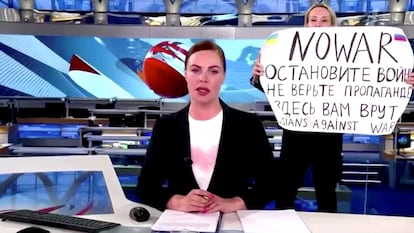Marina Ovsyannikova: The Russian journalist who said ‘no’ to the war
Footage of the reporter criticizing the conflict during a live TV broadcast has gone viral despite the Kremlin’s efforts to censor the video

The protest against Russia’s invasion of Ukraine lasted just a few seconds. During a live news broadcast on Monday, Russian journalist Marina Ovsyannikova burst onto the set with a sign reading: “No war. Don’t believe the propaganda. They’re lying to you here.” It was signed in English: “Russians against the war.”
While the news anchor tried to read from the teleprompter, Ovsyannikova – who is an international editor at Perviy Kanal (Channel One), Russia’s main television channel – yelled over her: “Stop the war. No to war.”
The protest – which could lead to serious sanctions under Russian President Vladimir Putin’s so-called “law against disinformation” – happened during a prime time broadcast of Bremya, a news show that Channel One has been screening since 1968. Footage of what happened had been shared by nearly all the Russian press by 10pm on Monday. But by Tuesday morning, nearly all news of the incident had disappeared from the headlines. The press also shared Ovsyannikova’s sign on social media, but the text was blurred to avoid being censored.
The Russian newspaper Novaya Gazeta published the image of Ovsyannikova on its front page on Tuesday. But the final line of her sign – “don’t believe the propaganda” – had been removed. The caption also provided scant detail, stating only that “a woman appeared with a poster whose complete content cannot be published” due to Russia’s criminal code and censorship agency Roskomnadzor.
But the protest spread like wildfire on social media, from Telegram channels to platforms blocked in Russia such as Twitter and Instagram. In order to access blocked sites, Russian users, including officials and some government agencies, use a VPN.
Meanwhile, Ovsyannikova received tens of thousands of comments on her Facebook page, many of them congratulating her for being a hero. The protest also went viral on RuNet, which is popularly known as the Russian internet. Social media users have not only been sharing the entire video of what happened and news of the incident, but also many memes, in which different messages appeared on the antiwar sign such as a shopping list. Others in favor of the war also placed messages showing support for the Russian offensive against Ukraine.
On Tuesday, the Kremlin press secretary, Dmitry Peskov, said: “As far as this woman is concerned, this is vandalism.”
Where is Ovsyannikova now?
After bursting on to the set Ovsyannikova was taken from the Ostankino Tower in Moscow to a police station, according to the Russian daily Kommersant and the news website OVD-Info, which specializes in anti-government protests and arrests. OVD-Info also offered legal assistance to the journalist, whose current whereabouts remained unknown on Tuesday. Under the Kremlin’s disinformation reform, any act that discredits the Russian armed forces can be considered a crime. As well as a fine, a person may face up to three years in prison, and up to 15 if their actions are found to have put the armed forces at risk.
Russian dissident Ivan Zhdanov, who is a close collaborator of jailed opposition leader Alexei Navalny, said in a message on Twitter that Ovsyannikova will likely face between five and 10 years in prison. The European Commission applauded the journalist’s courage, but expressed concern that her whereabouts were unknown, with her lawyers unable to make contact with her.
По Марине Овсянниковой ведется доследственная проверка по статье УК 207.3.
— Ivan Zhdanov (@ioannZH) March 15, 2022
Ей грозит от 5 до 10 лет.
Если они и правда это сделают, то героический поступок Марины будет вообще в истории.
Before her protest, Ovsyannikova shared a video in which she explained her reasons for taking action. “Regrettably, for a number of years, I worked on Channel One and worked on Kremlin propaganda, I am very ashamed of this right now. Ashamed that I was allowed to tell lies from the television screen. Ashamed that I allowed the zombification of the Russian people. We were silent in 2014 when this was just beginning. We did not go out to protest when the Kremlin poisoned [opposition leader Alexei] Navalny,” she said. Navalny was imprisoned at the beginning of 2021 shortly after returning to Russia from Berlin, where he had been recovering from alleged Novichok poisoning.

Tu suscripción se está usando en otro dispositivo
¿Quieres añadir otro usuario a tu suscripción?
Si continúas leyendo en este dispositivo, no se podrá leer en el otro.
FlechaTu suscripción se está usando en otro dispositivo y solo puedes acceder a EL PAÍS desde un dispositivo a la vez.
Si quieres compartir tu cuenta, cambia tu suscripción a la modalidad Premium, así podrás añadir otro usuario. Cada uno accederá con su propia cuenta de email, lo que os permitirá personalizar vuestra experiencia en EL PAÍS.
¿Tienes una suscripción de empresa? Accede aquí para contratar más cuentas.
En el caso de no saber quién está usando tu cuenta, te recomendamos cambiar tu contraseña aquí.
Si decides continuar compartiendo tu cuenta, este mensaje se mostrará en tu dispositivo y en el de la otra persona que está usando tu cuenta de forma indefinida, afectando a tu experiencia de lectura. Puedes consultar aquí los términos y condiciones de la suscripción digital.








































